immigration reform
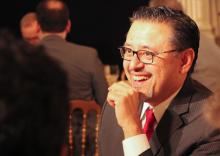
While Republican leaders blast President Obama for taking executive action on immigration reform, some prominent evangelical leaders are welcoming the president’s plans to keep about 5 million undocumented immigrants from being deported.
Evangelicals are a key voting bloc for the GOP, but on immigration some are taking a pragmatic step away from the party. They include Hispanic leaders such as the Rev. Samuel Rodriguez who say the time has come to manage what has become a “de facto humanitarian crisis” for millions of immigrants.
“This merciful action takes place because for years our government, under the leadership of both parties, failed miserably as it pertains to immigration,” said Rodriguez, president of the National Hispanic Christian Leadership Conference.
Rodriguez planned to be with Obama on Nov. 21 in Las Vegas, where the President hopes to rally for his new steps.

Editor's Note: Thursday evening, President Barack Obama announced he is taking action to reform pieces of our broken immigration system. See Sojourners President Jim Wallis' recap here. Below are President Obama's remarks as prepared for delivery.
My fellow Americans, tonight, I’d like to talk with you about immigration.
For more than 200 years, our tradition of welcoming immigrants from around the world has given us a tremendous advantage over other nations. It’s kept us youthful, dynamic, and entrepreneurial. It has shaped our character as a people with limitless possibilities – people not trapped by our past, but able to remake ourselves as we choose.
But today, our immigration system is broken, and everybody knows it.
Families who enter our country the right way and play by the rules watch others flout the rules. Business owners who offer their workers good wages and benefits see the competition exploit undocumented immigrants by paying them far less. All of us take offense to anyone who reaps the rewards of living in America without taking on the responsibilities of living in America. And undocumented immigrants who desperately want to embrace those responsibilities see little option but to remain in the shadows, or risk their families being torn apart.

Tonight, faith leaders and all those who have spent years trying to fix our broken immigration system should feel gratitude toward President Obama. In a primetime address to the nation, the president announced he was taking executive action to relieve some of the suffering caused by the failures of the status quo. Millions of families will no longer live under the daily threat of having their lives torn apart by senseless deportations, which is something all Christians – whether Republican or Democrat – should celebrate. Many of our brothers and sisters in Christ, who have spent significant portions of their lives hiding in the shadows, can now enjoy the flourishing God intends for us all. Their joy and well-being must inform our judgments of the president’s action, especially in light of the biblical call to “welcome the stranger.”
Unfortunately, the president’s compassionate actions are creating a political firestorm among some Republicans in Washington. Their anger and antipathy toward the White House are blinding them to the positive effects these measures will have for our society. Even after decades living and working in our nation’s capital, I’m still amazed at the many ways political ideology can prevent us from having “eyes that see” and “ears that hear.” I lament that our political discourse has come to this.
Everyone agrees the only way to find sustainable, long-term solutions is through Congress passing bipartisan legislation. The Senate did exactly that more than 500 days ago, but their honest efforts have languished in the House of Representatives because of Republican intransigence. GOP leaders promised alternative policy ideas; reform garnered widespread, nationwide support — including among a majority of Republicans; faith leaders were hopeful after countless positive conversations with members of Congress; the president even told me that he was “optimistic” about reform after conversations with Speaker John Boehner; the country, and, more importantly immigrant families, patiently waited — yet, the House failed to act.

Yesterday, President Obama released a short video providing more information on a much-anticipated executive action announcement on immigration policy. While the details remain unclear on how many of the 11 million undocumented and aspiring Americans will be covered, relief is rumored to the following:
- Temporary legal protection for undocumented parents of children who are legal U.S. citizens.
- Temporary legal protection for undocumented immigrants with a longstanding presence in the United States.
- Extension of the 2012 Deferred Action for Childhood Arrivals (DACA) program.
The president will address the nation tonight at 8 p.m. ET. Watch the speech live here.
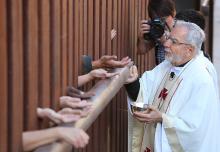
The nation’s Catholic bishops are jumping into the increasingly contentious battle over immigration reform by backing President Obama’s pledge to act on his own to fix what one bishop called “this broken and immoral system” before Republicans assume control of Capitol Hill in January.
In an unscheduled address Nov. 11 at the hierarchy’s annual meeting, Seattle Auxiliary Bishop Eusebio Elizondo, chairman of the migration committee of the U.S. Conference of Catholic Bishops, said the USCCB would continue to work with both parties to pass comprehensive immigration reform.
But, Elizondo said, given the urgency of the immigration crisis and the electoral gains by Republicans who have thwarted earlier reform efforts, “it would be derelict not to support administrative actions … which would provide immigrants and their families legal protection.”
“We are not guided by the latest headlines but by the human tragedies that we see every day in our parishes and programs, where families are torn apart by enforcement actions especially,” he said.
During the summer, the president was moving toward unilateral action on immigration, despite warnings that such moves could exceed his constitutional authority or would turn voters against reform.
Then in early September, Obama said he would delay acting on his own, a move that was seen as a way to protect vulnerable Democrats from any backlash in midterm elections. On Sunday, Obama told CBS’ “Face the Nation” that he was now “going to do what I can do through executive action.”
“It’s not going to be everything that needs to get done. And it will take time to put that in place,” he said.

Zach Szmara, Pastor of The Bridge Community Church in Logansport, Ind., was on a conference call when a young man entered the church. He put the call on hold to walk out of the office and meet him. In broken English, the man said, "Are you the people that help immigrants?" The man had driven more than 20 miles because he heard rumors of a church that loved the stranger.
Szmara said, "In that moment I was both humbled and convicted. I was humbled that our small church had such a reputation. Yet I was convicted that it was only very recently that I could answer 'yes' to the burning question of this young immigrant who came to me."
"I have lived overseas, and there my eyes could easily see the marginalized and the stranger in my midst. But at home in the states, I almost missed it, and almost missed how God has enriched my life because of it," Szmara continued.
The issue of immigration has dominated the headlines for much of this year. As Christians, we believe that – regardless of where we each may stand on the political spectrum – God’s heart for the immigrant is clear. In fact, the Hebrew word for an immigrant appears 92 times in the Old Testament alone, and the New Testament says in no uncertain terms that however we, as Christians, treat the stranger in our midst, is how we are treating Jesus himself.
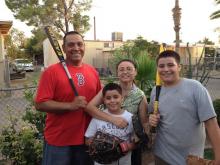
On Aug. 7 we lit a single white candle at the prayer service welcoming Rosa Robles Loreto into sanctuary at Southside Presbyterian Church in Tucson, Ariz. Almost 90 days later, that candle has been joined by five others, representing Luis Lopez Acabal, Beatriz Santiago Ramirez, Francisco Aguirre, Francisco Perez Cordova, and Arturo Hernandez. We are grateful that Beatriz was just granted a stay so that she could return to her home with her two small children, but the rest all remain in sanctuary.
As we approach Rosa’s 90th day in sanctuary, its time to replace the nearly burned down candle, but the light of radical Christian hospitality continues to not only burn bright, but spread throughout the nation.

In Tuesday’s elections, most voters didn’t see their candidates as leaders. Americans are cynical about politics, exhibited by the broad-based discontent with both parties, the president, and Congress. Nearly two thirds of the electorate didn’t even vote — turnout this year was likely lower as a percentage of the electorate than any time since 1942. Negative campaign ads reached depressing lows, directly appealing to Americans’ fears and anxieties, and most people don’t think the results of the election will change political gridlock in Washington. This election campaign was a loss for the common good.
We seem to have become cynically resigned to politicians always blaming the other party for every problem instead of solving them and alleged political leaders pursuing a 24/7, 52-week strategy of winning instead of governing. There are no more off election years to make society better; every day and every decision is just a part of the next campaign.
The campaigns and the media coverage were all about polls, attacks, and sound bites. The Republican campaign message was simply: vote against President Obama. And the Democrats deserted him, wouldn’t discuss either his accomplishments or his failures, and had no message of their own that got through. The campaign wasn’t about the most important issues facing the country. Here’s what we should be talking about.

While much of the country was receiving election returns and news of a red tide sweeping across the nation, here in Oregon we have more of a white, black, and brown problem.
One way to look at Oregon was that the “progressive” blues all won — our Democratic incumbents were all re-elected for U.S. Congress and governor, and statewide measures to legalize the sale and use of recreational marijuana sailed to an easy victory.
So, from a distance it looks like the dream of the Bill Clinton 90s is still alive in Portland.
I’ve been here more than a year now, planting a church and beginning to work with neighborhood partners, and have come to realize that the dream for truly “progressive” values — like immigration reform and bridging the gap in ever increasing income inequalities — is more like a bad dream that won’t go away.
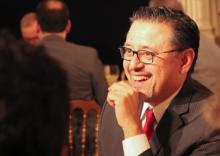
An alliance of evangelical organizations has pledged to dramatically increase the number of church-based legal clinics across the country to assist immigrants with the complicated processes of seeking green cards, visas and family unification.
The Immigration Alliance, a network of 15 evangelical denominations and ministries, on Oct. 21 launched a plan to reduce the gap between the 22 million immigrant noncitizens and the 12,000 private immigration lawyers in the country.
“Churches are a trusted presence in immigrant communities that can — and should — help address this critical shortage of legal services,” said Noel Castellanos, the alliance’s board chair and the CEO of the Christian Community Development Association, in announcing the new venture.
The alliance, which was formed in 2013, estimates that there also are 2,800 nonprofit attorneys and accredited staff in the country. The umbrella network includes the National Association of Evangelicals, the Assemblies of God, the Church of the Nazarene and the National Latino Evangelical Coalition, among others.

Unknown to most, sanctuary is actually one of the most ancient traditions we have as a people of faith. In the late Roman Empire, fugitives found refuge in early Christian churches; in medieval England, churches protected accused wrongdoers; and in the years before the Civil War, people of faith organized the Underground Railroad to help slaves flee the South. In the 1980s, nearly 500 congregations practiced sanctuary in an attempt to shelter the hundreds of Central Americans fleeing brutal violence in Guatemala and El Salvador.
Currently, the Sanctuary Movement allows members of congregations who are facing deportation to reside within the sacred space of a church, synagogue, or mosque in order to avoid immediate deportation from the Immigration and Customs Enforcement (ICE) agency. Although the ICE is not legally banned from entering churches or schools, custom is to avoid such sensitive areas unless a suspected terrorist or dangerous felon is involved.
Today there are currently 5 active sanctuary cases, along with 30 congregations who are offering sanctuary in Arizona, Colorado, Illinois, Washington, Maine, and Oregon. The Sanctuary Movement is important because it breaks down the polarized, politicized, and dehumanized aspects of immigration reform and looks instead to Christ as a model for loving one’s neighbor.
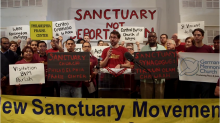
BREAKING NEWS:
There is a nonviolent uprising around immigration happening in Philadelphia and a dozen other U.S. cities. Philadelphia faith leaders announced that they will welcome immigrant families even if it is against the law. They are building a movement of "sanctuary congregations" and have dreams that the U.S. will one day be a sanctuary nation.
We join them in insisting that we must obey the laws of God over the laws of our government — and that means "welcoming the foreigner as if they were our own flesh and blood." (Exodus 22:21, Lev.19:34, etc., etc.).
Jesus says that when we welcome the stranger we welcome him. When God asks: "When I was a stranger did you welcome me?" (Mt. 25) we are not going to say: "Sorry God, Congress wouldn't let us."
We know that sometimes divine obedience can mean civil disobedience.
As St. Augustine once said: "An unjust law is no law at all."
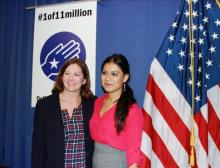
I absolutely love to read, and anyone who is familiar with Oscar Wilde I’m sure recognizes the quote I have chosen for my title; “To define is to limit.” From the moment I read this in The Picture of Dorian Gray, I thought to myself: this is me; this is how I see the world. Now I know people argue with this quote because a definition is a precise statement of what a word means. But just think of “define” as “label.” When you put a label on someone, you classify and constrict them, which limits them from breaking out their true potential.
For example, when we are constantly talked about as illegal aliens, we are given the image of harsh criminals. This image affects our self esteem and our confidence. Some, like Aly Wane, start to believe that there is something evil inside of them. It also limits us from reaching out to the American people and proving to them that we are not here to cause any harm. We only want the opportunity of seeking a brighter future. We are not criminals. We have done what we had to do, what any human would do, to seek a violence-free life, to keep our families together, or, like me, to pursue an education. I am one of 11 million, and each one of us has a different story to tell.

Midnight. 80 degrees. Palm trees, illuminated by the airport lights, lining the street. My dream was now a reality. Germany to Miami. I did it. I moved to America!
When I was 12, my family vacationed in upstate New York. From then on, I knew I wanted to live in America. When other children dreamed of becoming policemen, rock singers, and cowboys, my perpetual childhood dream was to become an American. I devoured books by German author Karl May, about an Apache warrior named Winnetou. His pride and honor started my fascination with this country.
I was 16 when I finished school in Germany, 17 when I finished school as an exchange student, and was 20 when I moved to Miami. I fell madly in love and we moved to Los Angeles. After some time, we moved to Detroit and got married. Then we broke up.
The breakup forced a brief pause as I unwillingly moved back to Germany to reset my visa. Before I left Detroit, I had set up an interview with another freight forwarder in Hamburg, under the condition that they would send me back to the U.S. I never, ever gave up on America — it was never, ever a consideration. Within ten days of arriving in Hamburg, I was at my new job at the German Freight Forwarder. Ten months later, I was back to my America — assigned to Houston.
When they moved me to Atlanta, I remarried. He was a contractor, and I quit my freight job so we could renovate houses together. Unfortunately, the relationship didn't work out. I thought I didn't need to worry about the visa situation because I was married to a U.S. citizen. Had our relationship worked out, I would have been on track for a temporary green card. I was single again, so I was in violation of my H1B visa — and of the five companies in Atlanta that I could have worked at, none of them had job openings.
I found a glimmer of hope — maybe I could switch to an entrepreneur visa. I quickly found an attorney to take my case, but later found out that he never filed anything.

America was a free country. There, freedom is everything. Growing up, that was the picture I had. America was the country where you’re free to do whatever you want.
It all changed when I turned 16. I woke up excited, ready to go to the DMV and get my driver’s license like all my friends were doing -- and then my parents told me that I was here illegally. I was undocumented. Reality sunk in. America was not a free country for me.

Last week would have been the 71st birthday of my mother who was tragically killed abroad 15 years ago. Because of my undocumented status, I still have not been able to visit her grave site. This experience is all too common in the undocumented community. This is one of the many reasons why, despite the fact that I am an American by default, I struggle with my connection with this country and with the very concept of citizenship.
My mother brought me here legally when I was 9 in 1985 after fleeing our home country of Senegal following a painful estate dispute once my biological father passed away. She found work as a diplomat at the United Nations, and I came here as her dependent. I then attended high school at Georgetown Preparatory School in Washington, D.C., and thus switched to a student visa. I continued my education in Philadelphia at the University of Pennsylvania for two years but had to leave because I couldn’t afford the tuition. My mother was in Zimbabwe then and I couldn’t afford going to join her. Unfortunately, neither my diplomatic visa nor my student visa statuses count towards getting a Green card. When I left school, my status lapsed, and I became undocumented. Three years later, my mother was killed — a victim of domestic violence. With no “home country” to go back to and no way to adjust my status, I had to adjust myself to a life in the shadows.
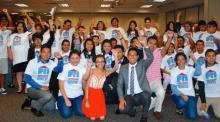
"Whoever welcomes one such child in my name welcomes me, and whoever welcomes me welcomes not me but the one who sent me.” —Mark 9:37, NRSV
I was raised in a family with strong beliefs in our faith. It is because of my faith that I continue to strive for a better future and do good to others. This is why I’m so passionate for my advocacy in education, regardless of gender, race, and immigration status.
When I lived in Mexico, I thought about America every day. To me, America was a country of freedom, a country where every dream could come true. My grandparents waited 12 years to get their visas. The wait was agonizing; every year we faced poverty and struggle in Zacatecas. With every year, my dreams of a better life in America got farther and farther away. The feeling of hopelessness was overwhelming and pushed me to attempt suicide.
In that moment, I turned to faith. My family came to my aid and helped me through. Knowing how desperate for opportunity I had become, my parents reached out to my aunt in the United States. Together, they saved enough money to pay for my visa application. I finally had a chance at a life outside of our small family farm.
It was the summer of 2009 when I finally arrived in America. I was 16.


My sons, Issac and Felipe are my pride and joy. My wife and I go to church with them every Sunday, and we spend our free time at the movies or enjoying a walk through downtown Chicago. We also take road trips, one of which brought us to New York City where we visited the Statue of Liberty and Ellis Island.
I brought them there because I wanted them to see
the most important American monument in person. The Statue of Liberty is the icon of freedom and a historic welcoming signal to immigrants.
Chicago is my home. It's been that way for the past 17 years. I'm a maintenance worker at a residential building and a member of SEIU Local 1. I'm kind of living the American dream. I say "kind-of" because my undocumented status has prevented me from pursuing better job opportunities. I had the chance to become an assistant engineer at my building but declined the offer because I'm scared of losing the job if my bosses discover that I'm undocumented.

Earlier this week Jose Antonio Vargas, joined by ten other undocumented immigrants, announced the 1 of 11 Million campaign in Washington to urge the delay of deportations for the millions of documented immigrants in the United States. Vargas is founder of Define American, a national organization that uses stories to shift the narrative on immigration in America, and hopes to influence the executive action debate.
The campaign plans to tell the personal stories of 11 people who come from diverse backgrounds and whose experiences reflect many of the 11 million undocumented immigrants in this country. By providing a snapshot of our complex, outdated, and unpredictable system, advocates hope that changes announced by Obama will address the needs of communities nationwide.